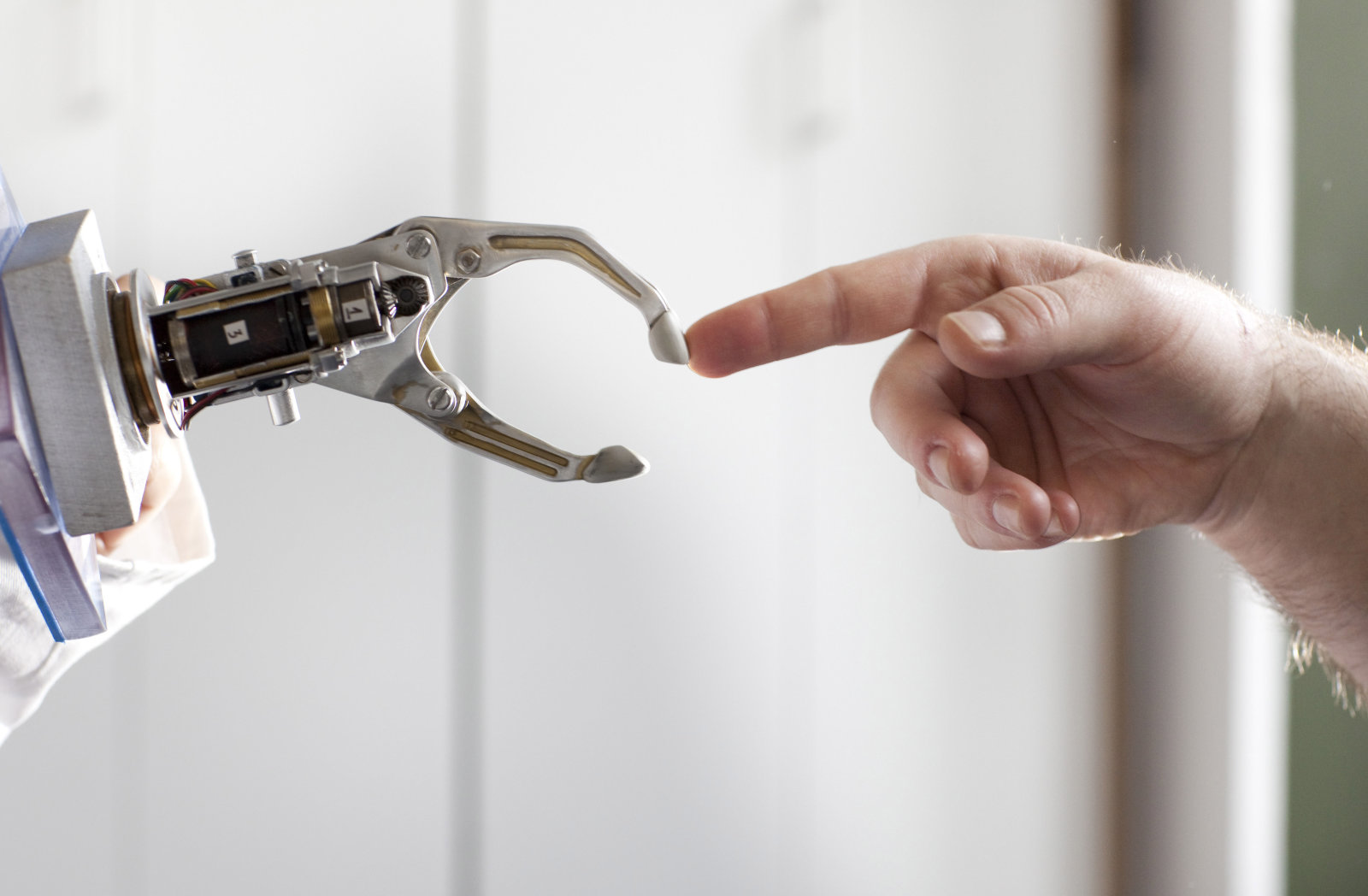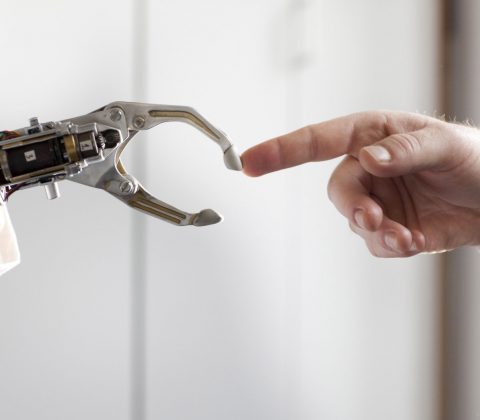Posts Tagged: brain
AI-enabled brain implant helps patient regain feeling and movement
Keith Thomas from New York was involved in a driving accident back in 2020 that injured his spine's C4 and C5 vertebrae, leading to a total loss in feeling and movement from the chest down. Recently, though, Thomas had been able to move his arm at will and feel his sister hold his hand, thanks to the AI brain implant technology developed by the Northwell Health's Feinstein Institute of Bioelectronic Medicine.
The research team first spent months mapping his brain with MRIs to pinpoint the exact parts of his brain responsible for arm movements and the sense of touch in his hands. Then, four months ago, surgeons performed a 15-hour procedure to implant microchips into his brain — Thomas was even awake for some parts so he could tell them what sensations he was feeling in his hand as they probed parts of the organ.
While the microchips are inside his body, the team also installed external ports on top of his head. Those ports connect to a computer with the artificial intelligence (AI) algorithms that the team developed to interpret his thoughts and turn them into action. The researchers call this approach "thought-driven therapy," because it all starts with the patient's intentions. If he thinks of wanting to move his hand, for instance, his brain implant sends signals to the computer, which then sends signals to the electrode patches on his spine and hand muscles in order to stimulate movement. They attached sensors to his fingertips and palms, as well, to stimulate sensation.
Thanks to this system, he was able to move his arm at will and feel his sister holding his hand in the lab. While he needed to be attached to the computer for those milestones, the researchers say Thomas has shown signs of recovery even when the system is off. His arm strength has apparently "more than doubled" since the study began, and his forearm and wrist could now feel some new sensations. If all goes well, the team's thought-driven therapy could help him regain more of his sense of touch and mobility.
While the approach has a ways to go, the team behind it is hopeful that it could change the lives of people living with paralysis. Chad Bouton, the technology's developer and the principal investigator of the clinical trial, said:
"This is the first time the brain, body and spinal cord have been linked together electronically in a paralyzed human to restore lasting movement and sensation. When the study participant thinks about moving his arm or hand, we ‘supercharge’ his spinal cord and stimulate his brain and muscles to help rebuild connections, provide sensory feedback, and promote recovery. This type of thought-driven therapy is a game-changer. Our goal is to use this technology one day to give people living with paralysis the ability to live fuller, more independent lives."
This article originally appeared on Engadget at https://www.engadget.com/ai-enabled-brain-implant-helps-patient-regain-feeling-and-movement-073711090.html?src=rss
Engadget is a web magazine with obsessive daily coverage of everything new in gadgets and consumer electronics
Phones don’t cause brain tumors, experts say
A growing body of evidence shows that mobile phones don’t cause brain cancer. The use of mobile phones does not increase brain tumor incidence, according to a new study. The research bolsters previous findings that show mobiles aren’t linked to brain cancer. “This study was so important because we saw a spike in cancer cases […]
Mobile | Digital Trends


NASA activated Curiosity’s second ‘brain’ after it misbehaved
 Tired? Sluggish? Wouldn't it be great if you could just switch your brain to a better functioning version? Well, that's a privilege you can enjoy if you're the Mars Curiosity rover. NASA's intrepid explorer has been subject to a few technical problem…
Tired? Sluggish? Wouldn't it be great if you could just switch your brain to a better functioning version? Well, that's a privilege you can enjoy if you're the Mars Curiosity rover. NASA's intrepid explorer has been subject to a few technical problem…
Engadget RSS Feed


ARM targets your brain with new implantable chips
 Elon Musk isn't the only one getting into the wetworks game. Chip manufacturer ARM announced on Wednesday that it is pairing with the Center for Sensorimotor Neural Engineering (CSNE) at the University of Washington to develop a line of brain-implant…
Elon Musk isn't the only one getting into the wetworks game. Chip manufacturer ARM announced on Wednesday that it is pairing with the Center for Sensorimotor Neural Engineering (CSNE) at the University of Washington to develop a line of brain-implant…
Engadget RSS Feed
‘Interscatter communication’ could help your brain implant talk to your iPhone
Researchers at the University of Washington have created a way of letting next-gen wearables and implants communicate with the outside world using 10,000 times less power than regular Wi-Fi.
The post ‘Interscatter communication’ could help your brain implant talk to your iPhone appeared first on Digital Trends.
Weekly Rewind: Facebook’s F8, your brain on LSD, and more
In the tech world, a lot happens in a week. So much news goes on, in fact, that it’s almost impossible for mere mortals with real lives to keep track of everything. That’s why we’ve compiled a quick and dirty list of the top 10 tech stories.
The post Weekly Rewind: Facebook's F8, your brain on LSD, and more appeared first on Digital Trends.


Scientists discover how your brain wakes you up
 Researchers believe they've identified the part of the brain which ends light sleep, called the non-rapid eye movement (NREM) cycle, and ultimately wakes you up. Professor Antoine Adamantidis from the University of Bern and his team found a neural ci…
Researchers believe they've identified the part of the brain which ends light sleep, called the non-rapid eye movement (NREM) cycle, and ultimately wakes you up. Professor Antoine Adamantidis from the University of Bern and his team found a neural ci…
Engadget RSS Feed
How brain readers are helping MMA fighters bounce back
Brain readers are leaving the lab and finding their way into gyms, where the advanced metrics they deliver can help MMA fighters determine when it’s safe to return to the ring.
The post How brain readers are helping MMA fighters bounce back appeared first on Digital Trends.
Newly developed artificial brain cells allow robots to navigate without sensors
Inspired by human anatomy, researchers at Singapore’s A*STAR have simulated the activity of location-sensing brain cells to help robots navigate.
The post Newly developed artificial brain cells allow robots to navigate without sensors appeared first on Digital Trends.
